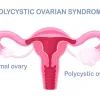How Common is PCOD Among Women?
PCOD, also known as Polycystic Ovary Syndrome, is a common hormonal disorder that affects women of reproductive age. It is estimated that PCOD affects 1 in 10 women worldwide. In India, the prevalence of PCOD is even higher, affecting around 1 in 5 women. This means that millions of women in India are living with this condition, and it is important to raise awareness and understanding about PCOD.
Understanding PCOD
PCOD is characterized by a hormonal imbalance in the body, leading to the growth of small cysts on the ovaries. These cysts can interfere with the normal functioning of the ovaries and can cause a range of symptoms. Some of the common symptoms of PCOD include:
- Irregular menstrual cycles: Women with PCOD may experience irregular or infrequent periods.
- Excessive hair growth: PCOD can cause excessive hair growth on the face, chest, and back.
- Acne: Many women with PCOD may experience persistent acne due to hormonal imbalances.
- Weight gain: PCOD can make it difficult to lose weight and can lead to unexplained weight gain.
- Fertility issues: PCOD is one of the leading causes of infertility in women.
Risk Factors for PCOD
While the exact cause of PCOD is unknown, there are several factors that can increase the risk of developing this condition. Some of the common risk factors include:
- Family history: If you have a close family member with PCOD, you may be at a higher risk of developing the condition.
- Insulin resistance: Insulin resistance and high insulin levels have been linked to PCOD.
- Obesity: Being overweight or obese can increase the risk of PCOD.
- Sedentary lifestyle: Lack of physical activity can also contribute to the development of PCOD.
- Hormonal imbalances: Imbalances in hormones such as insulin, androgens, and estrogen can contribute to the development of PCOD.
Diagnosis and Treatment
If you suspect you may have PCOD, it is important to consult a healthcare professional for a proper diagnosis. The diagnosis of PCOD typically involves a combination of medical history, physical examination, and blood tests to check hormone levels. Ultrasound imaging may also be used to examine the ovaries for cysts.
While there is no cure for PCOD, there are several treatment options available to manage the symptoms and improve overall health. The treatment plan may vary depending on the individual and their specific symptoms and goals. Some common treatment options for PCOD include:
- Lifestyle changes: Making healthy lifestyle choices such as regular exercise, a balanced diet, and weight management can help improve symptoms.
- Medications: Birth control pills, hormone-regulating medications, and insulin-sensitizing drugs may be prescribed to manage symptoms.
- Fertility treatments: Women who are trying to conceive may undergo fertility treatments such as ovulation induction or in vitro fertilization (IVF).
Taking Control of PCOD with Fitpaa
If you are one of the millions of women in India living with PCOD, Fitpaa can provide you with the support you need to manage your condition and achieve your health and fitness goals. Fitpaa’s personalized approach takes into account your unique metabolism, health condition, and fitness goals to create a customized plan just for you.
With Fitpaa’s AI-driven Metabolism Monitoring and Management technology, you can track and optimize your metabolism, leading to better overall health and improved PCOD symptoms. Fitpaa’s team of experts, including fitness coaches, nutritionists, and doctors, will guide you every step of the way and provide you with the tools and resources you need to succeed.
The Fitpaa app offers a wide range of features to make following your personalized plan easy and convenient. From virtual workout trainers and diet trackers to performance tracking and progress monitoring, the Fitpaa app has everything you need to stay on track and achieve your goals.
Don’t let PCOD hold you back from living your best life. Download the Fitpaa app today and take the first step towards managing your PCOD and achieving your health and fitness goals. Your wellbeing is our mission, and we are here to support you every step of the way.
Remember, with Fitpaa, nothing is impossible.









